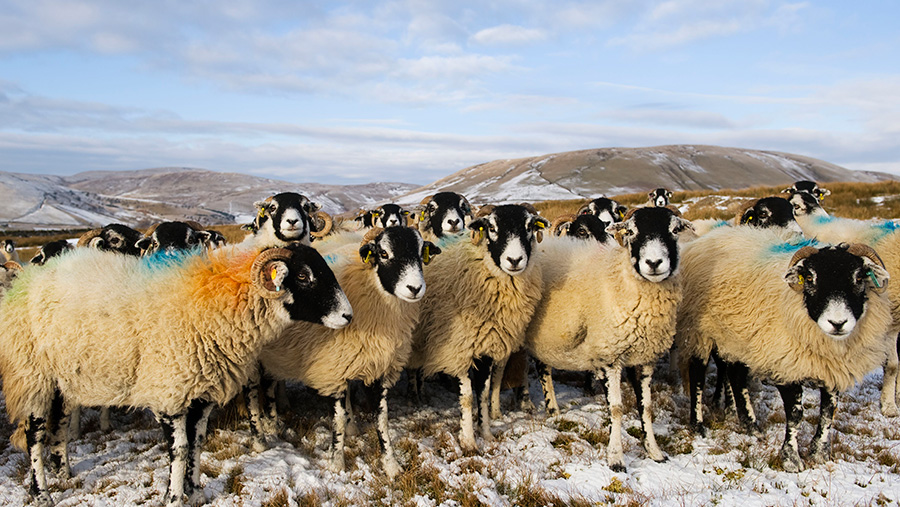AHDB examines Brexit prospects for agri-food trade
 © Design pics inc/REX/Shutterstock-
© Design pics inc/REX/Shutterstock- With less than 50 days to go until the UK is expected to leave the European Union, the future trade of agri-food products is still at stake.
The Agriculture and Horticulture Development Board (AHDB) has outlined the potential effect of an orderly and no-deal Brexit on trade across the main UK farming sectors.
In its latest Horizon report (PDF), the statutory levy body assesses the current trade situation, potential tariff levels and the size of the domestic production base.
See also: Why the price of lamb could drop by one-third after March
It suggests UK exports of agricultural and horticultural products are likely to be rendered uncompetitive if World Trade Organization (WTO) tariffs come into play on the UK’s exports to the EU.
However, if the UK government decides to drop all tariffs on imports from the EU, this would have to apply to the rest of the world, meaning UK products could face increased competition on the domestic market.
Compared with key international competitors, UK costs of production are high and therefore a no-deal Brexit could mean the loss of tariff barrier protection – and more competition from global producers.
Sheep sector concerns
The report found the sheep sector is likely to be hit worst in a no-deal scenario. UK exports would suffer considerably if WTO tariffs of up to 50% of the price of meat were put in place – a huge blow to the UK’s competitiveness.
In addition, about 90% of UK sheepmeat exports are to the EU, meaning no deal is likely to hit sheep farmers’ incomes.
For the dairy sector, if tariffs are imposed on all dairy imports, domestic prices are likely to rise, the report suggests.
Tariffs would also cause issues for cross-border trade between the UK and Republic of Ireland – large volumes of UK milk are exported to Ireland for processing, then the processed product shipped back – for example, cheddar.
Increased global competition
Conversely, if the UK government unilaterally drops import tariffs, increased competition from other global exporters would reduce the opportunity of import substitution for dairy products.
AHDB senior analyst Amandeep Kaur Purewal said: “The prospect of a no-deal scenario cannot be ignored. This would have a seismic impact on UK trade in agricultural and horticultural products, with major implications for the farming sectors.
“It is crucial farmers and policymakers fully understand the potential consequences of leaving the EU, whether in an orderly or disorderly manner, if we are to avoid massive disruption throughout the industry.”
Other key findings include:
Beef Exports to the EU would be limited considerably if tariffs, which are sometimes as high as the price of the product itself, came into play. If the UK government drops tariffs on imports, UK beef could see increased competition, meaning lower prices and returns for farmers.
Pork Tariffs on UK exports would lower their competitiveness in the EU market, where the UK currently ships about 60% of its pigmeat. Tariffs on imports would increase domestic prices, but UK pork would face increased competition and lower prices if tariffs are dropped, as well as potentially competing with products produced to lower or different standards.
Poultry Under a no-deal Brexit, the UK could see high volumes of cheaper poultrymeat coming in, making it difficult for UK producers to compete in terms of price. There is the possibility of imports of chlorinated chicken and/or poultrymeat produced with high antibiotics use.
Cereals The UK is a net exporter of barley, meaning exports could be hit with tariffs of €93/t outside a tariff rate quota (TRQ). The UK flour trade could see considerable disruption even if there is a free-trade agreement between the UK and EU, as rules of origin would still apply, disrupting trade with the Republic of Ireland.
Potatoes Additional phytosanitary controls on fresh and seed potato trade between the UK and EU would likely make the certification process longer, increasing costs for businesses.
Horticulture The UK is heavily reliant on imported fresh produce, so import tariffs would make these more expensive. In addition, tariffs on inputs such as fertilisers and pesticides would increase costs of production for growers. A critical shortage of seasonal labour in the UK could stymie any attempts to increase domestic production to substitute imports.
